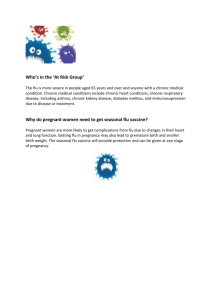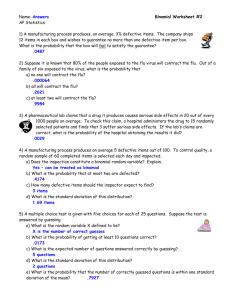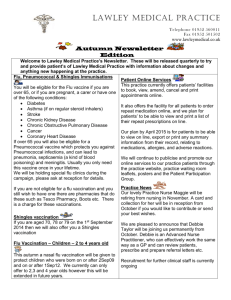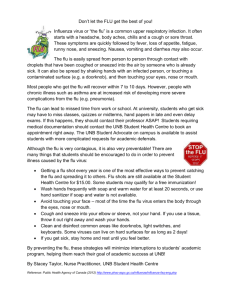Influenza Campaign 2015 - Aldergate Medical Practice
advertisement
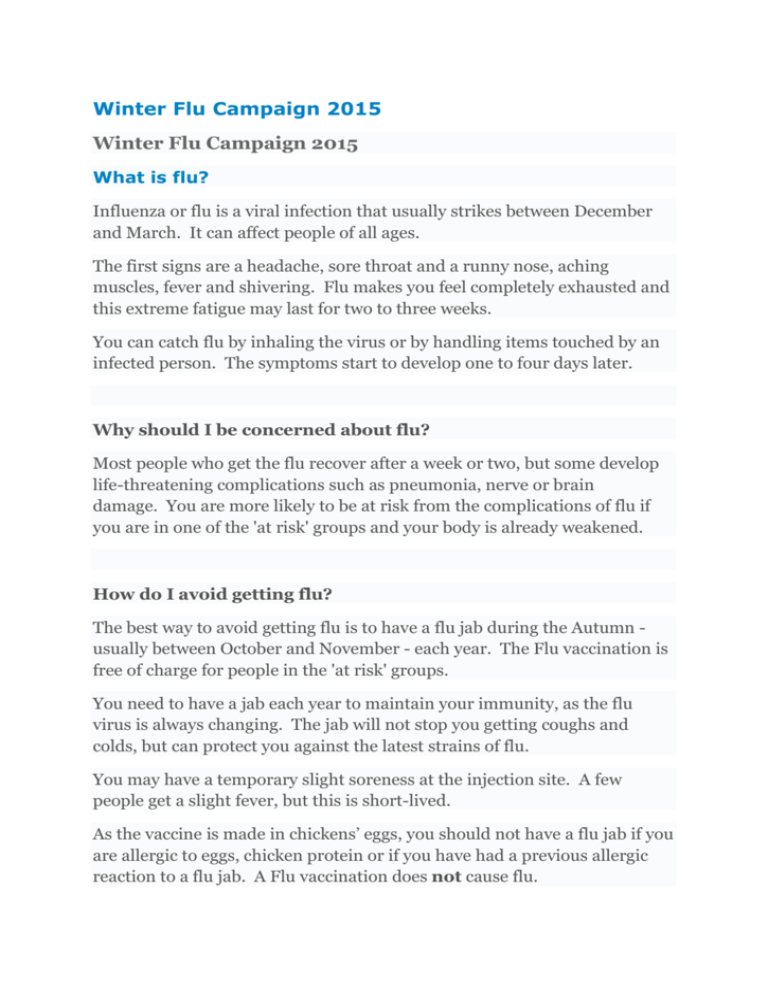
Winter Flu Campaign 2015 Winter Flu Campaign 2015 What is flu? Influenza or flu is a viral infection that usually strikes between December and March. It can affect people of all ages. The first signs are a headache, sore throat and a runny nose, aching muscles, fever and shivering. Flu makes you feel completely exhausted and this extreme fatigue may last for two to three weeks. You can catch flu by inhaling the virus or by handling items touched by an infected person. The symptoms start to develop one to four days later. Why should I be concerned about flu? Most people who get the flu recover after a week or two, but some develop life-threatening complications such as pneumonia, nerve or brain damage. You are more likely to be at risk from the complications of flu if you are in one of the 'at risk' groups and your body is already weakened. How do I avoid getting flu? The best way to avoid getting flu is to have a flu jab during the Autumn usually between October and November - each year. The Flu vaccination is free of charge for people in the 'at risk' groups. You need to have a jab each year to maintain your immunity, as the flu virus is always changing. The jab will not stop you getting coughs and colds, but can protect you against the latest strains of flu. You may have a temporary slight soreness at the injection site. A few people get a slight fever, but this is short-lived. As the vaccine is made in chickens’ eggs, you should not have a flu jab if you are allergic to eggs, chicken protein or if you have had a previous allergic reaction to a flu jab. A Flu vaccination does not cause flu. Flu vaccination is especially important if: You are aged 65 or older - Death from influenza is most common in the over 65s - you are more likely to have severe flu and be admitted to hospital than younger patients. You have had a stroke or TIA (mini stroke) - There is evidence that receiving the annual flu vaccine reduces the risk of a stroke in patients with a history of stroke or TIA. You have reduced immunit y - If you are receiving chemotherapy or steroid treatment; have no spleen; or if you have HIV/AIDS, your immune system is already considerably weakened. Flu will further reduce your capacity to fight infection. You are the main Carer for an elderly or disabled person - You should receive the flu vaccine if their welfare is at risk if you fall ill. You have diabetes - The death rate among people with diabetes can increase by between 5% and 15% when there is a lot of flu about. You have chronic heart disease - People with flu may experience changes or abnormalities in the rhythm of their heartbeat, which indicates there is a problem with the heart muscles. Studies have indicated that people with heart disease are less likely to have a heart attack if they have a flu jab. You have chronic kidney diseas e - Flu can cause dehydration which can worsen your kidney problems. You have chronic liver disease - You may be more susceptible to catching flu and more likely to develop complications or worsening of your liver disease. You have chronic lung disease - Flu can bring on asthma attacks and will make chronic bronchitis much worse. If you get flu, a secondary infection like pneumonia can set in. If you go on to develop pneumonia, the risk of developing further complications would be higher. You are pregnant - Pregnant women, who have not already received the H1N1 swine flu vaccine, should receive the seasonal flu vaccine. This is because pregnant women are at increased risk from the H1N1 virus, which is again expected to be predominant in the 2014/15 influenza season. If you fall into any of these 'at risk' categories, please contact the Surgery to make an appointment for a Flu Jab. If you have any questions not answered here, please ask the Practice Nurse or Doctor.

